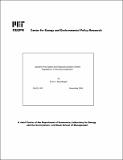| dc.contributor.author | Muehlegger, Erich J. | en_US |
| dc.contributor.other | Massachusetts Institute of Technology. Center for Energy and Environmental Policy Research. | en_US |
| dc.date.accessioned | 2009-04-03T17:06:28Z | |
| dc.date.available | 2009-04-03T17:06:28Z | |
| dc.date.issued | 2004 | en_US |
| dc.identifier | 2004-021 | en_US |
| dc.identifier.uri | http://hdl.handle.net/1721.1/45029 | |
| dc.description.abstract | Since 1999, gasoline prices in California, Illinois and Wisconsin have spiked occasionally well above gasoline prices in nearby states. In May and June 2000, for example, gasoline prices in Chicago rose twenty eight cents per gallon to $2.13, while prices nationally rose only nine to $1.73. Several qualitative studies identify unique gasoline formulations in California, Illinois and Wisconsin as crucial factors related to regional price spikes. This paper provides the first quantitative estimates of two distinct effects of state-level gasoline content regulations in California, Illinois and Wisconsin: (i) the effect of increased production costs associated with additional refining necessary to meet content criteria, and (ii) the effect of incompatibility between these blends and gasoline meeting federal reformulated gasoline (RFG) standards. Using a structural model based on the production optimization problem of refiners, I simulate wholesale prices for jet fuel, diesel and four blends of gasoline in each geographic market. I then specify a counterfactual in which gasoline in the three states only met federal RFG requirements. Using a constructed dataset of refinery outages, I am able to separately identify each effect. Using a similar methodology, I also estimate the effect of two other factors thought to increase gasoline prices, (i) changes in refinery ownership and (ii) limited expansion of domestic refining capacity. Point estimates for the effect of increased refining costs are 4.5, 3.0 and 2.9 cents per gallon in California, Illinois and Wisconsin. | en_US |
| dc.description.abstract | (cont.) The effect of incompatibility with federal RFG criteria, conditional on an in-state refinery outage, is 4.8, 6.6 and 7.1 cents per gallon in California, Illinois and Wisconsin. Controlling for the magnitude of local outages in these areas, I estimate that 72, 92 and 91 percent of price spikes created by local refinery outages could be mitigated by compatibility with federal RFG standards. I find that changes in refinery ownership in the late 1990₂s increase prices by 1.4 to 1.5 cpg in Illinois and Wisconsin and by 0.73 cents per gallon in California. A five-percent increase in domestic refining capacity reduces prices 3.7 to 3.8 cents per gallon in Illinois and Wisconsin and 4.3 cents per gallon in California. | en_US |
| dc.format.extent | 30, [12] p | en_US |
| dc.publisher | MIT Center for Energy and Environmental Policy Research | en_US |
| dc.relation.ispartofseries | MIT-CEEPR (Series) ; 04-021WP. | en_US |
| dc.title | Gasoline price spikes and regional gasoline context regulations : a structural approach | en_US |
| dc.type | Working Paper | en_US |
| dc.identifier.oclc | 58723741 | en_US |
